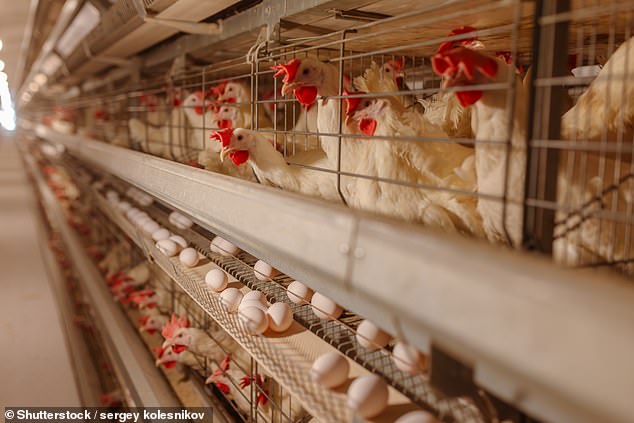With more than 500,000 chickens already culled due to an outbreak of bird flu at three Victorian farms, many Australians are rightly concerned about the safety of the food they eat.
Tensions rose when a child returning from India was confirmed to be Australia’s first case of bird flu A(H5N1), which has caused widespread bird deaths around the world.
Coles shoppers have been limited to buying two cartons of eggs due to supply chain issues caused by the outbreak in Victoria, leading to increased scrutiny of the crisis affecting Australian poultry farms. .
Since bird flu is also capable of being transmitted to cows, the main question people are asking is: can you get bird flu by eating chicken and eggs or drinking milk?
More than 500,000 chickens have had to be culled due to an outbreak of bird flu at two Victorian farms, and many Australians are concerned about the safety of the food they eat (file image).
How safe is chicken?
Since last month, there have been four outbreaks on Victorian poultry farms (three with H7N3 bird flu, one with H7N9 and one in Western Australia, H9N2).
These strains of bird flu can infect humans, but this is very rare and is usually caused by close contact with live infected birds or contaminated areas.
This means that there is very little chance of contracting bird flu from chicken meat.
But, as Professor Enzo Palombo of Swinburne University wrote in The conversation“It is timely to remind people to handle chicken meat with caution, as many dangerous pathogens, such as salmonella and campylobacter, can be found in chicken carcasses.”
Chicken meat should always be handled carefully when purchasing it, transporting it home, and storing it in the kitchen.
It is a good idea to use an insulated bag when transporting meat and refrigerate or freeze it within two hours.
Avoid washing chicken before cooking to avoid spreading illness-causing microbes in the kitchen.
Finally, cook chicken thoroughly, as viruses like bird flu cannot survive cooking temperatures.
What about the eggs?
Flu viruses can contaminate chicken eggs and potentially spread bird flu.
Viruses can enter through the eggshell because flu virus particles are smaller (100 nanometers) than the pores of the eggshell (at least 200 nanometers).
This means that viruses will not be removed by cleaning the outside of the egg, so it is best to cook eggs rather than eat them raw.
The U.S. Food and Drug Administration recommends cooking poultry, eggs and other animal products to the proper temperature and avoiding cross-contamination between raw and cooked foods.

Tensions rose when a child returning from India was confirmed to be Australia’s first case of avian influenza A (H5N1) – bird flu – which has caused widespread bird deaths around the world. The photo shows chickens on a poultry farm.
Is milk safe?
In Australia, where bird flu has not been reported in dairy cattle, milk and dairy products are safe to drink because they are pasteurized.
“Although there is little direct research on whether pasteurization inactivates H5N1 in milk, we can extrapolate what we know about thermal inactivation of H5N1 in chicken and eggs,” the professor wrote.
“Therefore, we can be sure that there is no risk of transmission of avian flu through milk or pasteurized dairy products.”
More than 80 dairy herds in at least nine American states have been infected with the H5N1 version of the bird flu virus.
Infected birds can shed the virus through saliva, nasal secretions and feces, so avian flu can contaminate animal food products during processing and manufacturing.
But Professor Palombo wrote that “the spread of avian flu among livestock, and possibly to humans, has probably occurred through contact with contaminated milking equipment, not the milk itself.”
The test used to detect the virus in milk is very sensitive, meaning it can detect very low levels of bird flu genetic material (RNA).
But the test does not distinguish between live or inactivated viruses, only that the RNA is present, so with that test alone it is not possible to know if the virus found in milk is infectious and capable of infecting humans.
In conclusion, Professor Palombo said: “If you consume pasteurized dairy products and cook chicken and eggs thoroughly, there is nothing to worry about, as bird flu is inactivated by heat.”

After Australia recorded its first human case of a strain of bird flu (pictured) that has been spreading around the world, Australians are being warned about symptoms to look out for.



